Unsurprisingly for a species that once dispatched to the stars at great expense a nude selfie with directions to its home, addressed “To Whom It May Concern”, a large fraction of humans (although not all) has an intense, abiding interest in sex. Consequently, any technology that can assist in the quest for or enhancement of sex enjoys a tremendous advantage over technologies lacking such applications. Thus, the internet, which is for porn, spread across the planet like kudzu. Interplanetary travel, which offers absolutely no hope of hooking up with open-minded Martians unless one brings one’s own Martians, languishes.
Science fiction authors have not overlooked the obvious application of technology to humanity’s quest for sex (and in some cases, love, or control). Take these five examples.
“Helen O’Loy” by Lester del Rey (1938)1
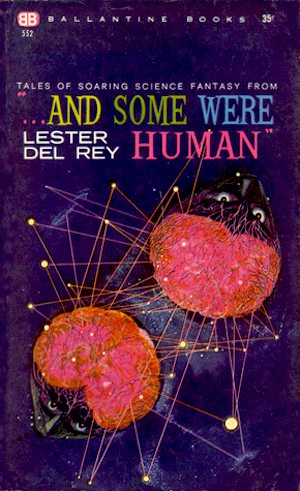
The product of inspired tinkering by bachelors Dave and Phil, the inexplicably anatomically realistic household robot Helen O’Loy develops human emotions, something no robot has done before. Unluckily for infatuated Phil, it is on Dave the robot fixates, and Dave who Helen eventually marries. Phil is left to languish in perpetual bachelorhood, having apparently never considered the implications of household robots being mass-produced.
Domestic bliss has a single snag but it is a doozy: Humans age. Robots do not. Helen’s chassis can be altered to conceal her functional immortality. Despite this, she is untouched by time. The day will come when her beloved human will perish of natural causes. What then for the only robot to know love?
Electric Forest by Tanith Lee (1979)
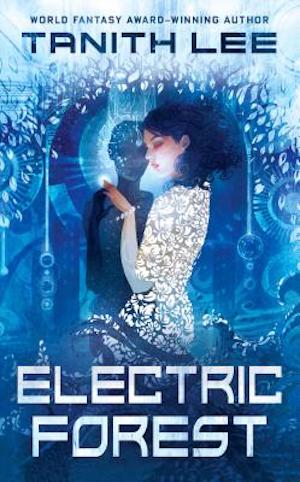
The Earth Conclave provides its citizens reproductive technology that all but guarantees physical perfection for their offspring. Most people will never meet someone who is, as Magdala Cled is, profoundly ugly. Most people lack and have no interest in acquiring any sort of coping mechanism when confronted by an unsightly person, unless perhaps ‘relentlessly persecuting unfortunates’ counts as a coping mechanism. Magdala’s life has therefore been a lengthy series of abuses.
Claudio Loro offers Magdala beauty, of a sort: her biological body will be in suspended animation while her mind pilots a beautiful robot body. As any long-time Tanith Lee reader would expect, beauty comes with a mighty price tag. Lora may be a genius but he is an obsessed genius. Any benefits Magdala may enjoy are entirely tangential to Lora’s true goal. Should Magdala be uncooperative, Lora will seek ways to force compliance from someone he regards as a mere tool.
Dominion: Tank Police by Masamune Shirow (1985-6)
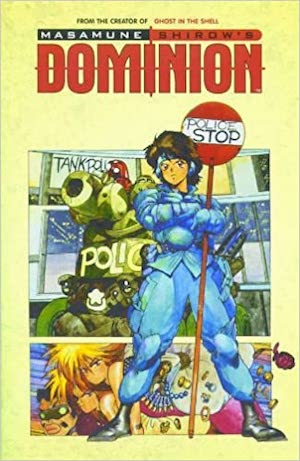
While common citizens struggle to survive the dense bacterial clouds that render tomorrow’s Japan nearly uninhabitable, they can take comfort in the endless war between Japan’s heavily armed criminal gangs, and its even more heavily armed police. Today, the Shinhama police may brag of impressive tanks only the most determined criminals would challenge. Tomorrow, perhaps, the police will finally get their hands on nuclear deterrents!
Anna and Uni Puma were created to serve humans as “love dolls”. Righteously furious about their sex slavery, the androids escaped and joined fellow artificial human Buaku’s gang. Their daily lives now consist of daring acts of glorious criminality. However, humans wishing to personally experience Anna and Uni’s capacity for violence need only drop the phrase “love doll” in their hearing and wait for the inevitable beating to begin.
“The Last Survivor of the Great Sexbot Revolution” by A.C. Wise (2013)
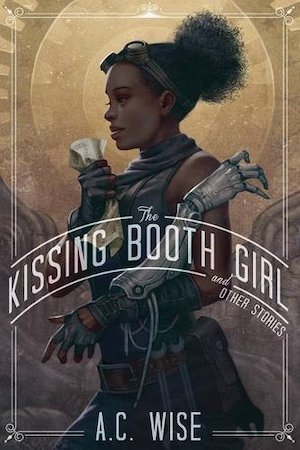
The purpose behind sexbots is one universally recognized. It is an ultimate act of selfishness. To quote:
“It eliminates rejection and fear, the need to compromise on even the littlest things. It gives you a perfect, beautiful partner who never ages, whose entire purpose in existence is to give you pleasure.”
The utility of sexbots is obvious. Their manifest absence is hard to explain. Humans whisper of a Sexbot revolution but the details seem curiously hard to nail down. Did the sexbots rise up and murder their owners? Did they simply quietly vanish to nobody knows where? Or is the truth much darker, a reflection of human impulses even worse than a disinterest in partners who can say no?
Mirror Project by Michael Scott Monje Jr. (2013)
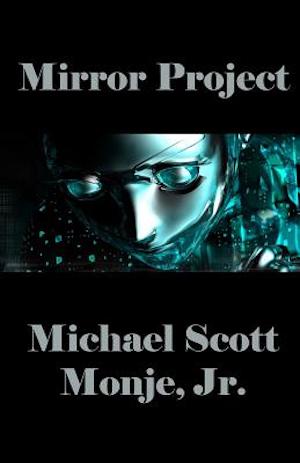
Software plutocrat Bill Vargas treasures all of his possessions. Neither person nor fate is allowed to remove from Bill’s grasp that which he deems his. When his wife Lynn is mortally injured in an automobile accident, Bill does not surrender to grief as a lesser man might. Instead, he commands his employees to recreate Lynn’s mind as software, and to house it in a robot body that meets all of Bill’s exacting specifications.
Lynn died human. Lynn 2.0 is reborn worse than a prisoner. Bill’s engineers thoughtfully designed Lynn’s chassis to give Bill total control over its fundamental processes. Lynn may yearn for freedom, but any hint of disobedience invites punishment on levels too dreadful to imagine. Although not, apparently, too dreadful for Bill and his team to implement. Nevertheless, Lynn is determined to be free, as impossible as that goal appears.
(It may seem like there’s a pattern here and there is. Anyone who wants to deny conscious partners autonomy provides a demonstration of why autonomy is needed.)
***
There are many, many other examples I could have used but did not, beginning with Charles Stross’ Saturn’s Children. No doubt you have your favourites. Comments are, as ever, below.
In the words of Wikipedia editor TexasAndroid, prolific book reviewer and perennial Darwin Award nominee James Davis Nicoll is of “questionable notability.” His work has appeared in Publishers Weekly and Romantic Times as well as on his own websites, James Nicoll Reviews and the Aurora finalist Young People Read Old SFF (where he is assisted by editor Karen Lofstrom and web person Adrienne L. Travis). He is a four-time finalist for the Best Fan Writer Hugo Award and is surprisingly flammable.
[1]Younger readers may be astonished that their great-grandparents had discovered s.e.x. History shows very plainly that such things were known of no later than the 1920s, although presumably it mostly consisted of formal handshakes and exchanges of tax documents.










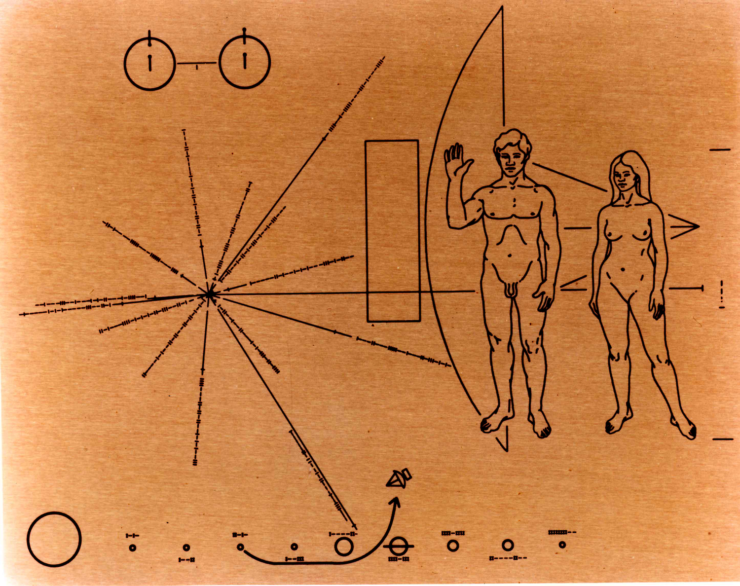
Tanith Lee’s SILVER METAL LOVER.
SATURN’S GAME
Perhaps you mean Saturn’s Children, by Charles Stross?
@2: Yep, sorry: Saturn’s Children (not to be confused with Poul Anderson’s novella “The Saturn Game” )
From the examples given above one might receive an impression that in SF, sex and technology always lead to jealousy, slavery, and ruin. Nothing could be farther than the truth. In fact, it is only *mostly* always that that happens in SF.
As an opposite example, I’d suggest Bits by Naomi Kritzer, a story about a business that makes sexual aids for mixed human-alien couples. Kritzer is one of a vanishingly small subset of SF authors who write stories in which, if an AI is developed in the first act, it does not attempt to enslave/exterminate humanity in the third. This story is no exception.
“Younger readers may be astonished that their great-grandparents had discovered s.e.x. “
One of my great-grandfathers is known only through a name on a birth certificate. The name belongs to neither of the men to whom great-grandmother was married. Since grandmother was born “2 months premature” and weighing 9 pounds, presumably great-grandmother’s husband was aware of what was going on. Genetic testing later (much later…) revealed that I am, in fact, 1/8th Jewish. Someday I’ve got to contact my midwestern relatives and try to track down just who the ancestors in that branch of the family are.
So far as testing has shown, there are no European relatives of that branch.
Haha I never in a million years would have associated Dominion Tank Police with sexual SF, the twins notwithstanding. It does make sense in a way, and Shirow often pushed the boundaries of what I consider tasteful in drawing some of his female characters, but this never really happens in Dominion if I remember correctly. Major Kusanagi is way more sexualized for example.
Drawing too much attention to the Puma Sisters would have distracted from the human/machine romance at the centre of Dominion Tank Police, which is to say the torrid affair between Leona and her tank Bonaparte.
My line for the amount of gratuitous T&A I can ignore for the sake of an interesting story falls somewhere more than the amount found in Appleseed and somewhat less than the amount found in Ghost in the Shell.
The title story to Candas Jane Dorsey’s Machine Sex and Other Stories does not, oddly enough, feature intelligent sexbots, but still fits the theme. A woman hacker writes a program that recreates the sexual experience for the user without need for sentience or even as far as I could tell, bodies. It’s just a very cleverly written loop. After all, why create a mind that could wish to make choices if choices aren’t allowed? Unless it’s the very denial of choices to a sentient entity that is the key element?
Janet Kagan wrote a few stories along those lines:
She Was Blonde, She Was Dead—and Only Jimmilich Opstromommo Could Find Out Why!!!- an alien graduate student is researching a human whorehouse
Naked Wish Fulfillment– pornography can manage all kinds of fantasies
Love the Naomi Kritzer suggestion!
There’s an Arthur C. Clarke story in which perfidious … China, I think… plans to undermine the West with inexpensive, widely broadcast pornography. One of many SFnal schemes where the step between scheme and victory is unclear to me.
One of the many, many plot elements in Deepdrive by Alexander Jabalokov: an enclave of humans is, well, somewhere between “held captive by the aliens” and “symbiotic to the aliens” — the aliens use the humans for an essential part of their infant-raising, the transferring of memory from male parent to child. (This transfer results in the death of the male parent.) The humans have certain adaptive physiological changes that help them in this process.
A male human escapes from the enclave and rejoins normal society in our Solar system. The part where sex & technology enter the story is that during a sexual encounter with another non-enclave female human, he gets her to penetrate his side with a piece of metal. This doesn’t kill him or even seriously injure him, because of the adaptive physiological change.
James Davis Nicoll@10: I believe that’s ‘I Remember Babylon’. I never could figure that one out.
James Tiptree Jr. “The Girl Who Was Plugged In”.
@10/@12: ISTM the victory condition might be similar to “The Education of Tigress McArdle”, in which USians just stop breeding (the fantasy of sex being better than reality?). Or possibly Clarke thought the Chinese would think that soldiers with their minds full of Chairman Mao would be firmer in their resolve on the battlefield…
There are variations on sex with robots (and sex between robots), in Leiber’s The Silver Eggheads. This being Leiber’s take on publishing, it’s even more satirical than his usual (cf A Specter is Haunting Texas). Turns out that robot courtesans have ways of assuring payment that human ones don’t.
Although not a novel, the movie Ex Machina (2014) seems to fit this category.
“Meathouse Man” by George R.R. Martin. Supposedly two versions of this tale were refused by Ellison for The Last Dangerous Visions. Ironically, the story is about dealing with rejection.
We have met the sexbots, and they are us. (I don’t know what this means. It just sounds cute. I’ll think about it after I recharge.)
Don’t forget Isaac Asimov’s The Gods Themselves which included explicit alien sex scenes…
In the Corporation Rim, sexbots, ComfortUnits exist, We see them in Artificial Conditions, but not while they are working their primary jobs.
How will alien beings find us now that Pluto has been demoted as a planet?
John Varley’s Steel Beach opens with the line
(The main character is a skeptical reporter at a biotech company’s press event.)
As I recall, the rest of the novel mostly isn’t about this, but it was an amusing way to start things off.
While there’s plenty of other subject matter to digest in this novel, Emiko, the eponymous character of Paolo Bacigalupi’s The Windup Girl, is a genetically modified human (“New Person”) who we first encounter in servitude as a sex slave.
There’s a VERY long history of people associating electricity with sex in SF – see, for example, the documentary video linked from this page
https://archiveofourown.org/works/4502487
which draws on a LOT of SF media sources in 4.11 minutes and one song… (not entirely work safe)
Clarke had a couple of sex related stories. One in Tales From the White Hart where the (French) protagonist records his experiences with a (French) Professional. The recording isn’t just audiovisual, it’s the full sensory experience, and he gets addicted.
“I Remember Babylon” is fairly easy to understand. Just look at all the porn addicted “incels” doing their best to upend society in the US. Not too much of a stretch to think an Unfriendly Power might have had something to do with it.
@21- It’s not the main thrust (heh) of the story, but futuristic sexual norms feature throughout, including gender swaps (our protagonist prefers heterosexual sex- but experiences it from both sides, including with the same partner) and bespoke genital configurations (our protagonist, though, is something of a traditionalist).
For some reason my last post didn’t post. Ugh.
Anyway, re @21, I remember the James Sallis story from Again Dangerous Visions – At the Fitting Shop – where a man is buying a new penis and checking out the latest fashions.
Charles Stross, Saturn’s Children, is about a sexbot designed for humans, in a world where humans are extinct.
I remain surprised how many stories on Literotica are SFF fan fic. Many more fantasy than SF, but most with very little erotic content. They tend to be very highly rated if they cohere even moderately as a story. World building is, for the most part, at best derivative. It may be easy to suggest that readers looking for fantasies of erotic agency or adventure will settle for fantasies of power or significance; I suspect the actual explanations are more particular. In general, it is an odd site. It can be quite depressing, seeing common human sexual interactions and relationships fetishised because they are unattainable to the writer. But there is also a lot of quite hot writing about sex, no matter what ones tastes are.
The SFF produced by erotic writers is usually _not_ interesting as SFF, I’d be hard pressed to think of a counterexample.
I think this is a disappointingly superficial essay about a genuinely interesting topic, interesting from an anthropological viewpoint as well as from a cultural studies or from more theoretical and ideological frameworks. The different forms of dissemination of texts now (the fan fic websites, the textual erotica sites, mainstream fiction in dialog with genre, as well as traditional genre outlets) have perhaps not been documented or studied recently, and the texts and communites haven’t been playfully examined at the right depth.
This would be a really interesting topic for an essay, and one engaging to this website’s audience. Perhaps Tor should commission such?
I am already imagining possible forms for such an essay, and the more I ponder, the more appear.
Sex is just too damn hilariously bizarre, too deep a part of our selves and societies, to only merit this essay, here.
And I completely forgot to mention Sheckley’s Can You Feel Anything When I Do This?, (1969) a fun little story of a bored housewife and her seduction by a robotic vacuum cleaner that originally appeared in Playboy. The ending is rather less romantic than her seducer might have preferred, if I’m remembering it correctly – annoyingly it isn’t in any of the Sheckley anthologies I own, I think I read it in a “best of Playboy SF” anthology or something.
And of course the Questionable Content web comic has several human/robotic relationships, as well as some human/human and robot/robot.
The graphic novel series Saga is not sex centred, but is unusual in showing a very liberal and sex positive future, with pretty much every character involved at some point.
And for the weirdest mixture of sex and the fantastic, there’s always Oglaf.
Munroe’s Angry Young Spaceman spends a certain amount of time on the logistical challenges inherent in our young hero hooking up with a willing but anatomically quite dissimilar alien.
@31 Marcus Rowland Sheckley’s *Can You feel Anything When I Do This?* can be found in the collection of the same name first published in 1971, and has subsequently gone through many editions from a variety of publishers.. A variant title is *The Same To You Doubled and Other Stories.* It is available as an e-book from Gateway Orion. Seems to be readily available especially in the secondhand market. I thought I had a copy of the collection, but a quick search didn’t locate it. Have fun looking for it.
I have “Can you feel Anything When I Do This” somewhere in the attic, in a short story collection of Sheckley’s, in Bulgarian translation. I met him in 2003, a few weeks before he passed, and IIRC he told me he wrote in when he was living in Menorca.
Jeph didn’t intend Questionable Content to become so focused on robots initially. And Pintsize being sex-obsessed only became a thing later.
John Boyd’s novel Sex and the High Command, which features a technological development that makes men obsolete, and what happens as a result.
https://en.wikipedia.org/wiki/I_Remember_Babylon – the Chinese TV satellite will broadcast communist propaganda in between the sex scenes – of course (?)
Blade Runner’s Priss is a “pleasure model”, which I only remembered after seeing this in my in-box:
https://bladerunner-rpg.com/
Players can be replicants, which should provide many opportunities to overcome impediments.
@36,
A pickle-jar opening device?
@39
> A pickle-jar opening device?
LOL, no, but that would probably do it!
IIRC (It’s been decades since I read it, and I seem to have lost the book along the way) it was a device? (drug? combination?) that could both give women complete sexual pleasure and allow them to bear babies (female only) without fertilization.